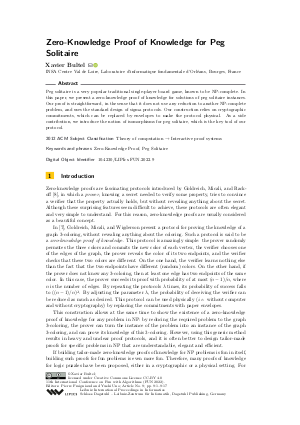Zero-Knowledge Proof of Knowledge for Peg Solitaire
Author
Xavier Bultel 
-
Part of:
Volume:
11th International Conference on Fun with Algorithms (FUN 2022)
Part of: Series: Leibniz International Proceedings in Informatics (LIPIcs)
Part of: Conference: International Conference on Fun with Algorithms (FUN) - License:
 Creative Commons Attribution 4.0 International license
Creative Commons Attribution 4.0 International license
- Publication Date: 2022-05-23
File

PDF
LIPIcs.FUN.2022.9.pdf
- Filesize: 0.82 MB
- 17 pages
Document Identifiers
Subject Classification
ACM Subject Classification
- Theory of computation → Interactive proof systems
Keywords
- Zero-Knowledge Proof
- Peg Solitaire
Metrics
- Access Statistics
-
Total Accesses (updated on a weekly basis)
0Document
0Metadata
Abstract
Peg solitaire is a very popular traditional single-player board game, known to be NP-complete. In this paper, we present a zero-knowledge proof of knowledge for solutions of peg solitaire instances. Our proof is straightforward, in the sense that it does not use any reduction to another NP-complete problem, and uses the standard design of sigma protocols. Our construction relies on cryptographic commitments, which can be replaced by envelopes to make the protocol physical. As a side contribution, we introduce the notion of isomorphisms for peg solitaire, which is the key tool of our protocol.
Cite As Get BibTex
Xavier Bultel. Zero-Knowledge Proof of Knowledge for Peg Solitaire. In 11th International Conference on Fun with Algorithms (FUN 2022). Leibniz International Proceedings in Informatics (LIPIcs), Volume 226, pp. 9:1-9:17, Schloss Dagstuhl – Leibniz-Zentrum für Informatik (2022)
https://doi.org/10.4230/LIPIcs.FUN.2022.9
BibTex
@InProceedings{bultel:LIPIcs.FUN.2022.9,
author = {Bultel, Xavier},
title = {{Zero-Knowledge Proof of Knowledge for Peg Solitaire}},
booktitle = {11th International Conference on Fun with Algorithms (FUN 2022)},
pages = {9:1--9:17},
series = {Leibniz International Proceedings in Informatics (LIPIcs)},
ISBN = {978-3-95977-232-7},
ISSN = {1868-8969},
year = {2022},
volume = {226},
editor = {Fraigniaud, Pierre and Uno, Yushi},
publisher = {Schloss Dagstuhl -- Leibniz-Zentrum f{\"u}r Informatik},
address = {Dagstuhl, Germany},
URL = {https://drops.dagstuhl.de/entities/document/10.4230/LIPIcs.FUN.2022.9},
URN = {urn:nbn:de:0030-drops-159798},
doi = {10.4230/LIPIcs.FUN.2022.9},
annote = {Keywords: Zero-Knowledge Proof, Peg Solitaire}
}
Author Details
References
- David Avis and Antoine Deza. On the solitaire cone and its relationship to multi-commodity flows. Mathematical Programming, 90:27-57, March 2001. URL: https://doi.org/10.1007/PL00011419.
- Robert A. Beeler and D. Paul Hoilman. Peg solitaire on graphs. Discrete Mathematics, 311(20):2198-2202, 2011. URL: https://doi.org/10.1016/j.disc.2011.07.006.
-
Mihir Bellare and Oded Goldreich. On defining proofs of knowledge. In Ernest F. Brickell, editor, Advances in Cryptology - CRYPTO' 92, pages 390-420, Berlin, Heidelberg, 1993. Springer Berlin Heidelberg.

- Xavier Bultel, Jannik Dreier, Jean-Guillaume Dumas, and Pascal Lafourcade. Physical Zero-Knowledge Proofs for Akari, Takuzu, Kakuro and KenKen. In Erik D. Demaine and Fabrizio Grandoni, editors, 8th International Conference on Fun with Algorithms (FUN 2016), volume 49 of Leibniz International Proceedings in Informatics (LIPIcs), pages 8:1-8:20, Dagstuhl, Germany, 2016. Schloss Dagstuhl-Leibniz-Zentrum fuer Informatik. URL: https://doi.org/10.4230/LIPIcs.FUN.2016.8.
-
Ronald Cramer, Ivan Damgård, and Berry Schoenmakers. Proofs of partial knowledge and simplified design of witness hiding protocols. In Yvo G. Desmedt, editor, Advances in Cryptology - CRYPTO '94, pages 174-187, Berlin, Heidelberg, 1994. Springer Berlin Heidelberg.

- Ivan Damgård. Commitment Schemes and Zero-Knowledge Protocols, pages 63-86. Springer Berlin Heidelberg, Berlin, Heidelberg, 1999. URL: https://doi.org/10.1007/3-540-48969-X_3.
- Oded Goldreich, Silvio Micali, and Avi Wigderson. Proofs that yield nothing but their validity for all languages in NP have zero-knowledge proof systems. J. ACM, 38(3):690-728, July 1991. URL: https://doi.org/10.1145/116825.116852.
- Shafi Goldwasser, Silvio Micali, and Charles Rackoff. The knowledge complexity of interactive proof-systems. In Proceedings of the Seventeenth Annual ACM Symposium on Theory of Computing, STOC '85, pages 291-304, New York, NY, USA, 1985. Association for Computing Machinery. URL: https://doi.org/10.1145/22145.22178.
-
Ronen Gradwohl, Moni Naor, Benny Pinkas, and Guy N. Rothblum. Cryptographic and physical zero-knowledge proof systems for solutions of sudoku puzzles. In Proceedings of the 4th International Conference on Fun with Algorithms, FUN'07, pages 166-182, Berlin, Heidelberg, 2007. Springer-Verlag.

- Luciano Gualà, Stefano Leucci, Emanuele Natale, and Roberto Tauraso. Large Peg-Army Maneuvers. In Erik D. Demaine and Fabrizio Grandoni, editors, 8th International Conference on Fun with Algorithms (FUN 2016), volume 49 of Leibniz International Proceedings in Informatics (LIPIcs), pages 18:1-18:15, Dagstuhl, Germany, 2016. Schloss Dagstuhl-Leibniz-Zentrum fuer Informatik. URL: https://doi.org/10.4230/LIPIcs.FUN.2016.18.
- Christopher Jefferson, Angela Miguel, Ian Miguel, and S. Armagan Tarim. Modelling and solving english peg solitaire. Computers & Operations Research, 33(10):2935-2959, 2006. Part Special Issue: Constraint Programming. URL: https://doi.org/10.1016/j.cor.2005.01.018.
-
Masashi Kiyomi and Tomomi Matsui. Integer programming based algorithms for peg solitaire problems. In Tony Marsland and Ian Frank, editors, Computers and Games, pages 229-240, Berlin, Heidelberg, 2001. Springer Berlin Heidelberg.

- Pascal Lafourcade, Daiki Miyahara, Takaaki Mizuki, Léo Robert, Tatsuya Sasaki, and Hideaki Sone. How to construct physical zero-knowledge proofs for puzzles with a “single loop” condition. Theoretical Computer Science, 888:41-55, 2021. URL: https://doi.org/10.1016/j.tcs.2021.07.019.
-
Torben P. Pedersen. Non-interactive and information-theoretic secure verifiable secret sharing. In CRYPTO, 1991.

- Bala Ravikumar. Peg-solitaire, string rewriting systems and finite automata. Theor. Comput. Sci., 321(2–3):383-394, August 2004. URL: https://doi.org/10.1016/j.tcs.2004.05.005.
- Tatsuya Sasaki, Daiki Miyahara, Takaaki Mizuki, and Hideaki Sone. Efficient card-based zero-knowledge proof for sudoku. Theoretical Computer Science, 839:135-142, 2020. URL: https://doi.org/10.1016/j.tcs.2020.05.036.
- Victor Shoup. Sequences of games: a tool for taming complexity in security proofs. Cryptology ePrint Archive, Report 2004/332, 2004. URL: https://ia.cr/2004/332.
-
Ryuhei Uehara and Shigeki Iwata. Generalized hi-q is np-complete. Transactions of the IEICE, 1990.

-
Emmanuel Volte, Jacques Patarin, and Valérie Nachef. Zero knowledge with rubik’s cubes and non-abelian groups. In Michel Abdalla, Cristina Nita-Rotaru, and Ricardo Dahab, editors, Cryptology and Network Security, pages 74-91, Cham, 2013. Springer International Publishing.

